
John James Audubon Painting Reproductions 1 of 3
1785-1851
Haitian Romanticism Painter
John James Audubon was born on 26 April 1785 in Les Cayes, Santo Domingo - now Haiti - as the illegitimate son of a French sea captain and a servant. Early loss marked his life, for his mother died when he was a small child, prompting his relocation to France in 1789. Under his father’s care near Nantes, he was encouraged to study geography, fencing, and mathematics, but it was his fascination with birds and the natural world that proved most enduring. While he later asserted that he received tutelage from Jacques-Louis David, no concrete records substantiate this claim, leaving much of his childhood artistic training open to speculation.
In France, he developed a habit of collecting nests, eggs, and various natural curiosities, turning his attention repeatedly to the act of drawing. Those early sketches, although amateur efforts, foreshadowed his mature explorations into avian subjects. Restless and apparently uncertain about a fixed vocation, Audubon ventured often into the countryside, an activity he would continue throughout his life, pursuing the outdoors with a zeal that overshadowed any conventional business pursuits.
In 1803, he traveled to America to manage Mill Grove, a farm near Philadelphia owned by his father. His focus, however, drifted quickly from financial responsibilities to the thrill of discovering and illustrating bird species. This disinterest in commerce contributed to mounting debts, and the farm eventually slipped from his ownership. Amid these misfortunes, Audubon met Lucy Bakewell, whom he married in 1808. The couple lived in several locations - Louisville, Henderson, New Orleans - often contending with economic instability. During Audubon’s extended absences, his wife provided much-needed support by serving as a governess and teacher.
By 1819, looming debts led to a brief imprisonment. In hopes of sustaining himself, he began making chalk likenesses - portraits in a humble medium that steadied his income for several years. He supplemented these earnings with taxidermy work in Cincinnati, though his fascination with fieldwork and sketching always overshadowed any practical engagements. Over time, his singular focus on birds would become both his artistic calling and his professional lifeline.
Despite having met Alexander Wilson - known for "American Ornithology" - in 1810, Audubon needed another decade to conceive the ambition of publishing his own collection of avian illustrations. Together with Joseph Mason, a young artist adept at depicting plants and insects, he gathered material in Cincinnati, New Orleans, and Natchez, aiming to detail the birds in natural poses rather than the traditional static formats. Around 1822, Audubon briefly took lessons in oil painting from John Stein, but watercolor soon became his favored medium, offering a fluidity that complemented his direct observations in the wild.
A visit to Philadelphia in 1824, where he displayed his art at the Academy of Natural Sciences, did not yield official sponsorship or acceptance, largely due to competing loyalties toward Wilson’s established body of work. Undeterred, Audubon sought patronage overseas, arriving in England in 1826. He presented his drawings at the Royal Institution in Liverpool, garnering an encouraging reception. Over time, he secured subscribers and partnered with London engravers Robert Havell & Son, who would transform his watercolor renderings into large folio plates - an ambitious endeavor requiring significant resources and unwavering dedication.
This project culminated in "The Birds of America," released in parts between 1827 and 1838 and ultimately comprising 435 hand-colored engravings. Many naturalists then were accustomed to stark, neutral backgrounds for specimens, so Audubon’s dramatic composition and poses sparked debate. In the field, he devised wire armatures to manipulate freshly killed birds into seeming animation - a method that introduced a liveliness deemed both controversial and forward-thinking. The resulting images captured subtle avian anatomies alongside the vitality of living creatures, granting his work a persuasive immediacy seldom seen at the time.
In tandem with these visual depictions, Audubon documented his field observations in his "Ornithological Biography," published in five volumes between 1831 and 1839. This undertaking enhanced his public stature; he lectured to diverse audiences and conversed with significant figures, including President Andrew Jackson. Encouraged by this success, he produced a reduced version of "The Birds of America," employing lithography instead of engraving, and followed it with "The Viviparous Quadrupeds of North America," a collaboration with his son John Woodhouse and their friend, the Reverend John Bachman. These efforts enjoyed remarkable reception, granting the artist comfort in his later years.
His final residence was Minnie's Land, a parcel of property overlooking the Hudson River in what is now upper Manhattan. It was there, in relative tranquility, that he spent his remaining years until his death on 27 January 1851. The naturalist-artist’s legacy resides not merely in the technical prowess of his prints, but in his enduring commitment to capturing the energies and behaviors of birds on paper, an approach that reconfigured how individuals regarded both ornithology and the art of illustration.
In France, he developed a habit of collecting nests, eggs, and various natural curiosities, turning his attention repeatedly to the act of drawing. Those early sketches, although amateur efforts, foreshadowed his mature explorations into avian subjects. Restless and apparently uncertain about a fixed vocation, Audubon ventured often into the countryside, an activity he would continue throughout his life, pursuing the outdoors with a zeal that overshadowed any conventional business pursuits.
In 1803, he traveled to America to manage Mill Grove, a farm near Philadelphia owned by his father. His focus, however, drifted quickly from financial responsibilities to the thrill of discovering and illustrating bird species. This disinterest in commerce contributed to mounting debts, and the farm eventually slipped from his ownership. Amid these misfortunes, Audubon met Lucy Bakewell, whom he married in 1808. The couple lived in several locations - Louisville, Henderson, New Orleans - often contending with economic instability. During Audubon’s extended absences, his wife provided much-needed support by serving as a governess and teacher.
By 1819, looming debts led to a brief imprisonment. In hopes of sustaining himself, he began making chalk likenesses - portraits in a humble medium that steadied his income for several years. He supplemented these earnings with taxidermy work in Cincinnati, though his fascination with fieldwork and sketching always overshadowed any practical engagements. Over time, his singular focus on birds would become both his artistic calling and his professional lifeline.
Despite having met Alexander Wilson - known for "American Ornithology" - in 1810, Audubon needed another decade to conceive the ambition of publishing his own collection of avian illustrations. Together with Joseph Mason, a young artist adept at depicting plants and insects, he gathered material in Cincinnati, New Orleans, and Natchez, aiming to detail the birds in natural poses rather than the traditional static formats. Around 1822, Audubon briefly took lessons in oil painting from John Stein, but watercolor soon became his favored medium, offering a fluidity that complemented his direct observations in the wild.
A visit to Philadelphia in 1824, where he displayed his art at the Academy of Natural Sciences, did not yield official sponsorship or acceptance, largely due to competing loyalties toward Wilson’s established body of work. Undeterred, Audubon sought patronage overseas, arriving in England in 1826. He presented his drawings at the Royal Institution in Liverpool, garnering an encouraging reception. Over time, he secured subscribers and partnered with London engravers Robert Havell & Son, who would transform his watercolor renderings into large folio plates - an ambitious endeavor requiring significant resources and unwavering dedication.
This project culminated in "The Birds of America," released in parts between 1827 and 1838 and ultimately comprising 435 hand-colored engravings. Many naturalists then were accustomed to stark, neutral backgrounds for specimens, so Audubon’s dramatic composition and poses sparked debate. In the field, he devised wire armatures to manipulate freshly killed birds into seeming animation - a method that introduced a liveliness deemed both controversial and forward-thinking. The resulting images captured subtle avian anatomies alongside the vitality of living creatures, granting his work a persuasive immediacy seldom seen at the time.
In tandem with these visual depictions, Audubon documented his field observations in his "Ornithological Biography," published in five volumes between 1831 and 1839. This undertaking enhanced his public stature; he lectured to diverse audiences and conversed with significant figures, including President Andrew Jackson. Encouraged by this success, he produced a reduced version of "The Birds of America," employing lithography instead of engraving, and followed it with "The Viviparous Quadrupeds of North America," a collaboration with his son John Woodhouse and their friend, the Reverend John Bachman. These efforts enjoyed remarkable reception, granting the artist comfort in his later years.
His final residence was Minnie's Land, a parcel of property overlooking the Hudson River in what is now upper Manhattan. It was there, in relative tranquility, that he spent his remaining years until his death on 27 January 1851. The naturalist-artist’s legacy resides not merely in the technical prowess of his prints, but in his enduring commitment to capturing the energies and behaviors of birds on paper, an approach that reconfigured how individuals regarded both ornithology and the art of illustration.
51 Audubon Paintings
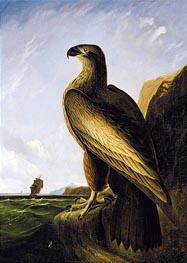
Washington Sea Eagle c.1836/39
Oil Painting
$1994
$1994
Canvas Print
$61.66
$61.66
SKU: AJJ-4427
John James Audubon
Original Size: 116.8 x 84.5 cm
Smithsonian American Art Museum, Washington, USA
John James Audubon
Original Size: 116.8 x 84.5 cm
Smithsonian American Art Museum, Washington, USA
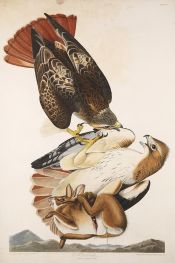
Red-Tailed Hawk, Buteo jamaicensis 1829
Paper Art Print
$54.25
$54.25
SKU: AJJ-4428
John James Audubon
Original Size: unknown
Fine Arts Museums of San Francisco, California, USA
John James Audubon
Original Size: unknown
Fine Arts Museums of San Francisco, California, USA
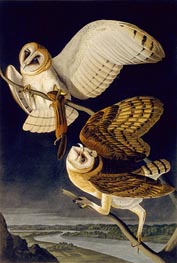
Barn Owl 1833
Oil Painting
$2243
$2243
SKU: AJJ-4429
John James Audubon
Original Size: unknown
Fine Arts Museums of San Francisco, California, USA
John James Audubon
Original Size: unknown
Fine Arts Museums of San Francisco, California, USA
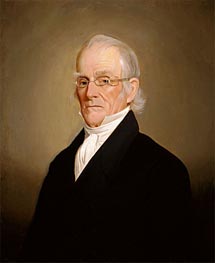
Colonel Nathaniel Rochester 1824
Oil Painting
$1843
$1843
SKU: AJJ-4430
John James Audubon
Original Size: unknown
Memorial Art Gallery at the University of Rochester, New York, USA
John James Audubon
Original Size: unknown
Memorial Art Gallery at the University of Rochester, New York, USA
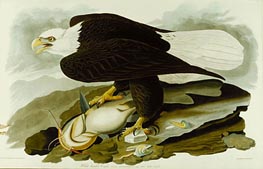
The Bald Headed Eagle from Birds Of America c.1827/30
Oil Painting
$1966
$1966
SKU: AJJ-4431
John James Audubon
Original Size: unknown
Terra Museum of American Art, Chicago, USA
John James Audubon
Original Size: unknown
Terra Museum of American Art, Chicago, USA
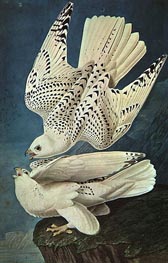
White Gerfalcons n.d.
Oil Painting
$1843
$1843
Paper Art Print
$53.80
$53.80
SKU: AJJ-4432
John James Audubon
Original Size: 96 x 64.7 cm
Private Collection
John James Audubon
Original Size: 96 x 64.7 cm
Private Collection
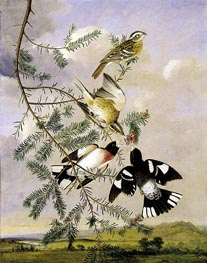
Rose Breasted Grosbeak 1806
Oil Painting
$2096
$2096
Canvas Print
$66.94
$66.94
SKU: AJJ-4434
John James Audubon
Original Size: 66.8 x 52.7 cm
Smithsonian American Art Museum, Washington, USA
John James Audubon
Original Size: 66.8 x 52.7 cm
Smithsonian American Art Museum, Washington, USA

Pileated Woodpecker n.d.
Oil Painting
$2271
$2271
SKU: AJJ-4435
John James Audubon
Original Size: unknown
Fine Arts Museums of San Francisco, California, USA
John James Audubon
Original Size: unknown
Fine Arts Museums of San Francisco, California, USA
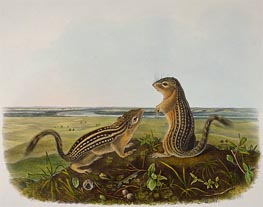
Leopard Spermophile (Spermophilus Tridecemlineatus) 1848
Paper Art Print
$53.80
$53.80
SKU: AJJ-4436
John James Audubon
Original Size: 40.6 x 41.9 cm
Minneapolis Institute of Arts, Minnesota, USA
John James Audubon
Original Size: 40.6 x 41.9 cm
Minneapolis Institute of Arts, Minnesota, USA
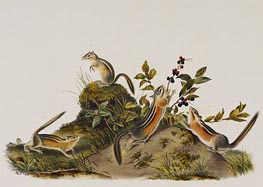
Four Striped Ground Squirrell (Tamias Quadivittatus) 1848
Paper Art Print
$70.68
$70.68
SKU: AJJ-4437
John James Audubon
Original Size: 47 x 55.8 cm
Minneapolis Institute of Arts, Minnesota, USA
John James Audubon
Original Size: 47 x 55.8 cm
Minneapolis Institute of Arts, Minnesota, USA
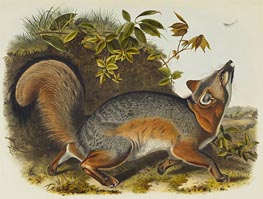
Grey Fox 1845
Paper Art Print
$79.65
$79.65
SKU: AJJ-4438
John James Audubon
Original Size: 49.5 x 59.7 cm
Minneapolis Institute of Arts, Minnesota, USA
John James Audubon
Original Size: 49.5 x 59.7 cm
Minneapolis Institute of Arts, Minnesota, USA
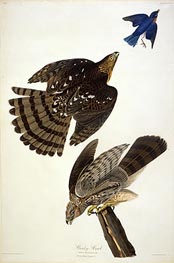
Stanley Hawk n.d.
Paper Art Print
$90.12
$90.12
SKU: AJJ-12077
John James Audubon
Original Size: 96.2 x 63.5 cm
Whitney Gallery of Western Art, Wyoming, USA
John James Audubon
Original Size: 96.2 x 63.5 cm
Whitney Gallery of Western Art, Wyoming, USA
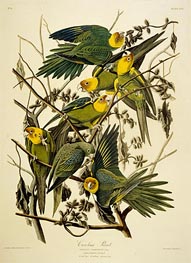
Carolina Parrot. Psittacus. From Birds of America 1827
Paper Art Print
$59.00
$59.00
SKU: AJJ-12078
John James Audubon
Original Size: 99 x 65 cm
Whitney Gallery of Western Art, Wyoming, USA
John James Audubon
Original Size: 99 x 65 cm
Whitney Gallery of Western Art, Wyoming, USA
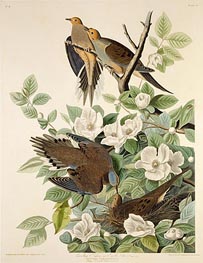
Carolina Pigeon or Turtle Dove c.1825
Paper Art Print
$104.86
$104.86
SKU: AJJ-12079
John James Audubon
Original Size: 86 x 63.5 cm
Whitney Gallery of Western Art, Wyoming, USA
John James Audubon
Original Size: 86 x 63.5 cm
Whitney Gallery of Western Art, Wyoming, USA
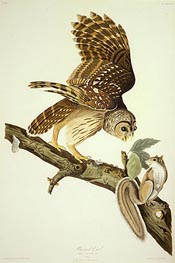
Barred Owl 1828
Paper Art Print
$90.12
$90.12
SKU: AJJ-12080
John James Audubon
Original Size: 95.2 x 62.8 cm
Whitney Gallery of Western Art, Wyoming, USA
John James Audubon
Original Size: 95.2 x 62.8 cm
Whitney Gallery of Western Art, Wyoming, USA
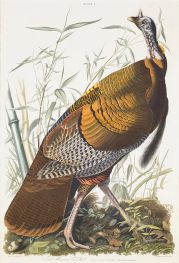
Great American Cock, Male, VULGO (Wild Turkey) ... 1826
Paper Art Print
$55.59
$55.59
SKU: AJJ-12081
John James Audubon
Original Size: 100.5 x 67.4 cm
Amon Carter Museum, Texas, USA
John James Audubon
Original Size: 100.5 x 67.4 cm
Amon Carter Museum, Texas, USA
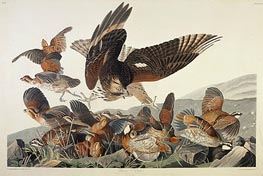
Virginian Partridge, Perdix Virginiana 1830
Paper Art Print
$90.90
$90.90
SKU: AJJ-12082
John James Audubon
Original Size: 65.7 x 100 cm
Whitney Gallery of Western Art, Wyoming, USA
John James Audubon
Original Size: 65.7 x 100 cm
Whitney Gallery of Western Art, Wyoming, USA
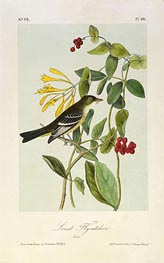
Least Flycatcher a.1843
Paper Art Print
$53.80
$53.80
SKU: AJJ-12083
John James Audubon
Original Size: 26.6 x 16.5 cm
Whitney Gallery of Western Art, Wyoming, USA
John James Audubon
Original Size: 26.6 x 16.5 cm
Whitney Gallery of Western Art, Wyoming, USA
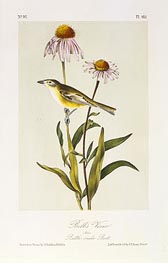
Bell's Vireo a.1843
Paper Art Print
$53.80
$53.80
SKU: AJJ-12084
John James Audubon
Original Size: 26.6 x 16.5 cm
Whitney Gallery of Western Art, Wyoming, USA
John James Audubon
Original Size: 26.6 x 16.5 cm
Whitney Gallery of Western Art, Wyoming, USA
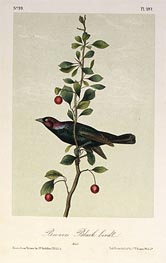
Brewers Black Bird a.1843
Paper Art Print
$53.80
$53.80
SKU: AJJ-12085
John James Audubon
Original Size: 26.6 x 16.5 cm
Whitney Gallery of Western Art, Wyoming, USA
John James Audubon
Original Size: 26.6 x 16.5 cm
Whitney Gallery of Western Art, Wyoming, USA
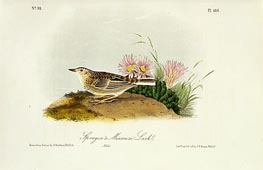
Sprague's Missouri Lark 1844
Paper Art Print
$53.80
$53.80
SKU: AJJ-12086
John James Audubon
Original Size: 17.1 x 26.3 cm
Whitney Gallery of Western Art, Wyoming, USA
John James Audubon
Original Size: 17.1 x 26.3 cm
Whitney Gallery of Western Art, Wyoming, USA
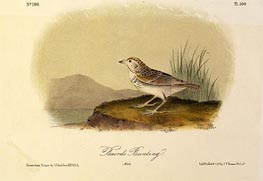
Baird's Bunting a.1843
Paper Art Print
$53.80
$53.80
SKU: AJJ-12087
John James Audubon
Original Size: 16.3 x 26.3 cm
Whitney Gallery of Western Art, Wyoming, USA
John James Audubon
Original Size: 16.3 x 26.3 cm
Whitney Gallery of Western Art, Wyoming, USA
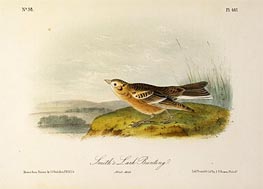
Smith's Lark Bunting a.1843
Paper Art Print
$53.80
$53.80
SKU: AJJ-12088
John James Audubon
Original Size: 16.3 x 26.3 cm
Whitney Gallery of Western Art, Wyoming, USA
John James Audubon
Original Size: 16.3 x 26.3 cm
Whitney Gallery of Western Art, Wyoming, USA
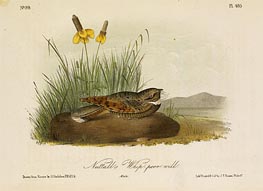
Nuttall's Whip-Poor-Will a.1843
Paper Art Print
$53.80
$53.80
SKU: AJJ-12089
John James Audubon
Original Size: 16.3 x 26.3 cm
Whitney Gallery of Western Art, Wyoming, USA
John James Audubon
Original Size: 16.3 x 26.3 cm
Whitney Gallery of Western Art, Wyoming, USA